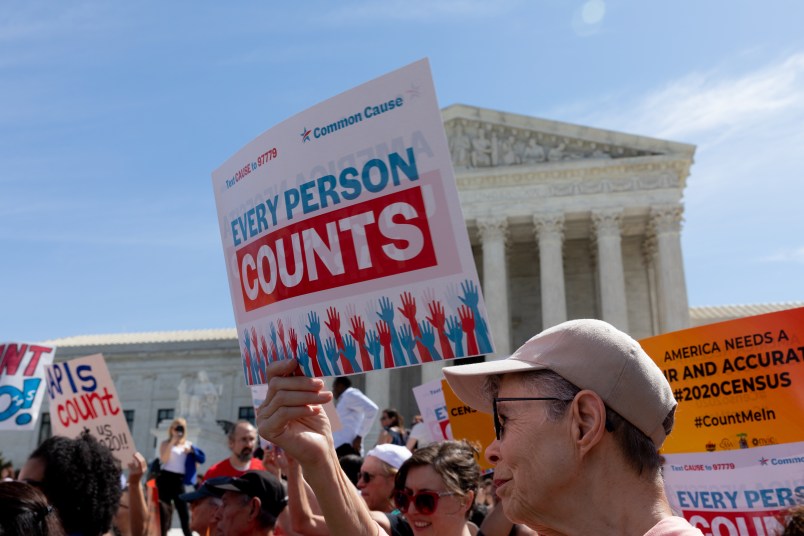A Census Bureau official told Republican legislators at a conservative confab last week that they’ll get the citizenship data they need to do a redistricting overhaul that will further entrench the GOP’s electoral advantages.
The statement from Kathleen Styles, the head of the Bureau’s stakeholder relations, came amid a set of panels focused on redistricting at ALEC’s annual conference in Austin, the Texas Observer reported.
State legislators at the conference were encouraged by prominent conservative activists to consider drawing legislative districts based on the number of citizens, rather than total population, which is what is currently used almost everywhere. Such a move would shift political representation toward whiter, more rural parts of the country and away from its more diverse, urban regions.
“For states that want to use citizenship, you will have the data,” Styles said, according to the Observer, when pressed by legislators on whether they’d have access to the citizenship data that would make such an overhaul feasible.
The Census Bureau told Congress earlier this month that it was producing citizenship data in a form that would make it usable for redistricting. The Bureau, however, has not formally announced the redesign of the redistricting file so that it will include the citizenship data.
A Census Bureau spokesperson told TPM it was invited by ALEC to address the conference and that the Bureau is “in the process of setting up an opportunity for Kathleen to have this same type of information sharing with a group from the other side of the aisle.”
After President Trump lost the legal battle to add a citizenship question to the 2020 census, he announced an executive order directing the administration to assemble citizenship data based on existing government records.
There have been questions raised about the reliability of such an approach.
That ALEC — which provides blueprint legislation for GOP statehouses on an assortment of conservative causes — is mobilizing around citizen-based redistricting reflects how seriously Republicans are taking the effort, despite the setback dealt in the census question fight.
The Supreme Court ruled in 2016 that use of total population is a permissible approach to redistricting. It avoided the question of whether states can use some other metric, such as the number of citizens.
If a state tries to do so in the next round of redistricting in 2021, it will face a legal challenge that will almost certainly make its way up the Supreme Court.
Panelists at the ALEC conference warned legislators broadly of the threat of lawsuits after the next round of redistricting, according to the Texas Observer report.
“Start with the idea that you’re going to be sued,” Cleta Mitchell, a conservative super-lawyer, told attendees.
“Your notes from this conference and this workshop will probably be part of a discovery [in a future lawsuit],” she said, according to the Observer. “”So my advice is if you don’t want it turned over as part of discovery, you probably ought to get rid of it before you go home.”







Let us hope that their sheer incompetence protects us once again.
For states that want to go bankrupt defending yourselves in court, you’ll have the data.
”So my advice is if you don’t want it turned over as part of discovery, you probably ought to get rid of it before you go home.”
Sounds like advice a mob lawyer would give to his client, doesn’t it? I don’t know why this was a conference rather than just a large-scale walk-talk around Mulberry Street.
Superlawyer?
Start by assuming impending litigation.
Destroy materials you know will qualify as evidence and anticipate will be admissible as such.
That’s called advising people to commit a potential crime and is certainly advising them to commit spoliation, which opens the door for a judge permitting the jury to draw negative inferences from the absence of the materials and potentially from their destruction if there’s enough there to show that they existed and were destroyed. IOKIYAR
Hmm, this smells a leetle bit misprisionish of felonyish: Misprision of felony - Wikipedia
ETA: of course, it is not felony to disenfranchise voters by bunching them into over-dense districts, nor even to strike them from the voter rolls via arbitrary transparently error-prone rules.